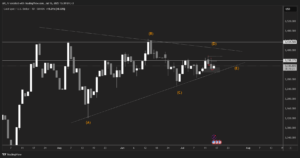European stocks opened lower, pressured by inflation fears.
European stocks started trading on Tuesday, February 28, with a decline, amid a sharp drop in the share of Travis Perkins, British building materials, after disappointing annual profits, in addition to data from France and Spain that confirmed that curbing inflation is more complex than expected. The STOXX Europe 600 index fell 0.4% by 08:10 GMT.
Preliminary data showed that inflation rose annually in France to 7.2% in February, compared to 7% in January, partly due to increased food prices.
In Spain, data showed that consumer prices rose 6.1% annually in February, compared to 5.9% in January, which was higher than the rate analysts had expected at 5.7%.
Travis Perkins shares plunged 7.6% after the annual profit of Britain’s largest supplier of building materials fell 16% in light of lower real estate returns and restructuring costs.
European markets closed sharply higher on Monday, but concerns remain about continuing to raise interest rates in the United States and the eurozone to curb inflation, which measures have not yet succeeded in reducing.
Slight gains for US stocks after last week’s losses.
US stocks achieved slight gains at the close of trading yesterday, Monday, as investors searched for deals after last week’s losses and continued fears of upcoming interest rate increases to tame high inflation. At the end of the session, the Dow Jones rose by 0.2%, or about 72 points, to 32,889 points, and the Nasdaq rose by 0.6%, or about 72 points, to 11,467 points, while the S&P 500 index rose by 0.3%, or 12 points, to 3,982 points.
Last Friday’s data showed that consumer spending in the United States recorded the largest increase in nearly two years during January. This index is the Fed’s favorite criterion for measuring inflation and taking monetary action.
Bitcoin continues its decline but is still trading above $23,000.
Bitcoin continues its decline during Tuesday’s trading with the rise of the dollar amid expectations that the Federal Reserve will continue to raise interest rates to combat inflation.
Bitcoin was down 0.41% at $23,232.75 at 07:57 GMT, according to Coinbase data. Ethereum also fell 0.18% to $1,620.33, and Ripple fell 1.26%, at 37.43 cents. According to digital asset manager CoinShares, short-term Bitcoin ETFs saw $10 million inflows over the past week ending February 24.
Gold prices are heading towards recording the largest monthly loss since June 2021.
Gold prices declined on Tuesday, amid the continued uncertainty experienced by investors, following fears of monetary tightening from the Federal Reserve and anticipation of the release of economic indicators.
All yellow metal futures for April delivery decreased by 0.28% to $ 1819.8 an ounce at 07:14 GMT, and the spot delivery price, by 0.28%, to $ 1811.98 an ounce.
Precious metal prices are down by about 5.8% in February, heading towards recording the largest monthly loss since June 2021.
Silver futures for March delivery also settled at $20.69 an ounce, and the spot price of platinum at $942.68, while palladium rose 0.73% to $1441.96.
Today, investors are awaiting the release of US data, including the composite house price index and the consumer confidence index for February. The numbers are expected to increase to 108.5 points from the previous 107.1 points to determine consumer sentiment and optimism about the US economy.
US Treasury Secretary: There are legal obstacles to confiscating Russian assets to help Ukraine.
US Treasury Secretary Janet Yellen said Monday, February 27, that Russia should bear the costs of damages from the war in Ukraine. Still, there are significant legal obstacles to confiscating frozen key Russian assets. Yellen said the United States would consider Ukraine’s calls for sanctions on Russia’s nuclear energy sector but needed to be aware of the potential consequences of such action for Western allies.
She indicated that the United States and its allies are discussing strategies to ensure that Russia pays the price for the devastation left by its war, with estimates amounting to hundreds of billions of dollars and is increasing daily as it enters the second year. The United States and its Western allies confiscated over $300 billion of central bank foreign currency assets frozen due to the sanctions. The assets are held abroad, with much of it at the Federal Reserve Bank of New York, but remain under Russian ownership.
Russia’s nuclear energy sector has escaped several sanctions, partly because many western countries, including France, depend on Russia’s Rosatom for uranium supplies.
“We want to deprive Russia of revenue,” Yellen said. “We also need to consider the potential consequences of sanctions for ourselves and our partners.”
She also asserted that the United States had warned China of “severe consequences” if the Beijing government, Chinese companies, or financial institutions provided material support for Russian military operations or helped Moscow evade US sanctions.
Growth hopes in China support higher oil prices.
Oil prices rose in Asian trading today, Tuesday, supported by hopes that a solid economic recovery in China will lead to an increase in demand for fuel, which will ease concerns about the rise in US interest rates that affect consumption in the largest economy in the world.
Brent crude futures for April, which expires on Tuesday, rose 39 cents to $82.84 a barrel by 08:42 GMT. The most active contracts for May rose 73 cents to $83.05 a barrel. US crude futures also climbed 71 cents to $76.39 a barrel.
Brent crude recorded monthly losses of about 2.2%, and US crude recorded monthly losses of about 3.8%.
Expectations of a recovery in demand in China added to the gains as the market awaits critical data over the next two days. Economists had expected factory activity to grow in the world’s second-largest economy in February.
JPMorgan analysts said in a note to clients: “China’s economic recovery will raise its demand for commodities, and oil will make the biggest gains.”
Oil analysts at JPMorgan kept their average forecast for Brent crude futures for 2023 at $90 a barrel.
Japanese stocks stabled at closing amid economic assessments.
Japanese stock indices settled flat at the close of trading on Tuesday amid investors’ assessment of economic data to find clues about monetary policy trends for the coming period.
Retail sales in Japan rose 6.3% in January yearly, beating expectations for a 4.0% rise, reflecting an increase in consumption that may add further to inflationary pressures.
Japanese industrial production fell by 4.6% in January, the most notable decline in the economy in eight months, led by the auto industry, semiconductor equipment, and technical devices.
The Nikkei index settled at the end of the session at 27445 points, while the Topix index at 1993 points. The US currency settled against its Japanese counterpart at 136.25 yen at exactly 06:47 GMT.
Disclaimer: This article is not investment advice or an investment recommendation and should not be considered as such. The information above is not an invitation to trade and it does not guarantee or predict future performance. The investor is solely responsible for the risk of their decisions. The analysis and commentary presented do not include any consideration of your personal investment objectives, financial circumstances, or needs.





